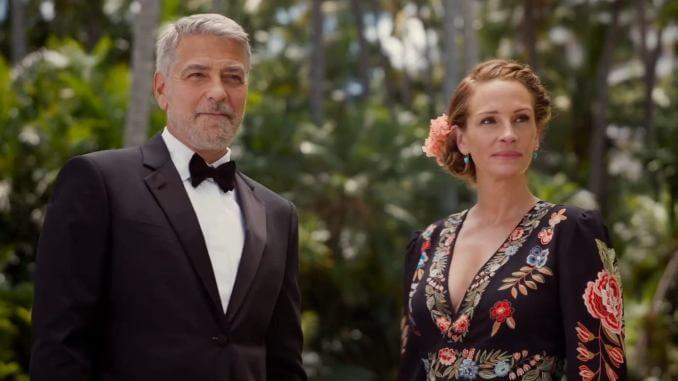Instead of Getting a Ticket to Paradise, Get a Ticket to Another Movie

One of the biggest tragedies of the modern age is that big-budget rom-coms have become almost obsolete. While back in the good ol’ days (the 2010s, even), films like Just Go With It and 50 First Dates were equipped with a healthy budget of around $80 million, present-day rom-coms are not given the same royal treatment, and tend to go straight to streaming and fly mostly under the radar as a result. Which is why, when the world caught news that ‘90s and early-2000s rom-com darlings Julia Roberts and George Clooney were co-starring in a $60 million rom-com bound for a coveted and increasingly scarce theatrical release, one couldn’t help but anticipate that it marked the genre’s exhilarating renaissance. Alas, this exciting prospect only makes the crushing disappointment that is Ticket to Paradise that much more devastating.
Ticket to Paradise follows the impossibly debonair David (Clooney) and his quick-witted gallerist ex-wife Georgia (Roberts), who loathe one another to a comical degree. The exes are dead-set on avoiding one another for the rest of eternity, but as life (or rom-com plots) goes, they are forced to come together when their aspiring-lawyer daughter Lily (Kaitlyn Dever) announces she is moving to Bali to marry seaweed farmer Gede (Maxime Bouttier), whom she met on a post-grad vacation. In a desperate attempt to stop their daughter from making the same catastrophic mistake they did a couple decades prior, David and Georgia travel to Bali. Hilarity ensues.
Except it doesn’t. A high-concept premise undeniably ripe for faux pas and endless farce falls flat almost the second David and Georgia touch down in Bali. The odd-ex-couple hatches a plan to feign support for Lily and Gede while tampering with their wedding behind-the-scenes—a “trojan horse,” David calls it. But if you come into Ticket hoping it will actually commit to its own premise, you’re setting yourself up for disappointment.
David and Georgia only end up making about one-and-a-half feeble attempts to get between the happy couple, with ideas so void of humor or creativity that they end up feeling a lot more cruel than funny. Surely this set-up calls for something a little more wacky and creative than just… stealing a ring.
The plot almost completely drops off halfway through to make room for stale, safe and not particularly funny humor. For the majority of its runtime, Ticket bounces between scenes where David and Georgia unconvincingly bicker in a way that reveals absolutely nothing about their characters, and insecure attempts at G-rated raunchy humor. To paint a picture, one of the film’s running jokes involves a big ol’ pack of condoms; another centers around one of the characters really liking to get her drink on. If a pack of multi-colored contraceptives isn’t funny enough for you, then don’t worry! At least the film has more jokes where the protagonists—wait a second—make fun of Balinese culture? Sorry to be that person, but shouldn’t a throwback to funny wedding-stopping antics of rom-coms past, a la Meet the Parents or My Best Friend’s Wedding, actually be funny?
-

-

-

-

-

-

-

-

-

-

-

-

-

-

-

-

-

-

-

-

-

-

-

-

-

-

-

-

-

-

-

-

-

-

-

-

-

-

-

-








































